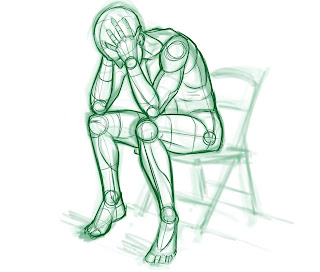The world is increasingly a place that is both unfamiliar and unfriendly to our brains. Global networks, complex digital systems, massive volumes of data, digital speeds, automated decision-making and persistent communications have all emerged this century and they are challenging the quality of our human experience. Already nearing our mind's limits to absorb change, we must quickly find ways to adapt.
The relatively slow speed of our physical and mental evolution over thousands of years seems to have been left behind in an instant by the unimaginable speed of digital evolution. How are today's humans to adapt in only a lifetime?
It appears likely that our brains will increasingly be fed on digital stimuli. It doesn't take a futurist to look around and see that we are all being irresistibly drawn deeper into the digital world. The results being our future will increasingly involve our brains, and those of our children and grandchildren, being formed, influenced and sustained on digital stimuli. Is this stimuli good for us? Will it make us healthier and happier?
How will our brains handle these changes? How will it impact our mental health? Who is looking out for us? The Food and Drug Administration (FDA), in the USA, seems to be mainly focused on, "ensuring the safety, efficacy, and security of human and veterinary drugs, biological products, and medical devices; and by ensuring the safety of our nation's food supply, cosmetics, and products that emit radiation." I did not find in this description a focus on our mental or digital health. I wonder how other countries consider and care for the mental health of their citizens?
The challenge we have as humans is finding our role in the emerging future. Artificial intelligence, automation, robotics, super computers and profit-driven motives will increasingly squeeze us humans into narrower roles. Are these the roles we want? Will these roles feel rewarding and bring us contentment? Will we thrive and flourish in these roles?
The question I keep asking myself is, "Are we guiding our future, or is the future guiding us?" Are we simply the victims of whatever future emerges, or can we guide our future to a better place? Will human compassion, intelligence, kindness and wisdom lead us into a better future, or will we become refugees displaced from the familiar physical world to live out our days in an unfamiliar digital dystopia?
This is where both philosophy and theology come in. In some belief systems, the sooner the world ends the better, while others believe our responsibilities and obligations should consider the welfare of today's humans, and tomorrow's. Are future humans any less worthy than today's humans? If less, how much less - half, three-quarters, a tenth?
Kevin Benedict
Partner | Futurist at TCS
View my profile on LinkedIn
Follow me on Twitter @krbenedict
Join the Linkedin Group Digital Intelligence
***Full Disclosure: These are my personal opinions. No company is silly enough to claim them. I work with and have worked with many of the companies mentioned in my articles.



No comments:
Post a Comment